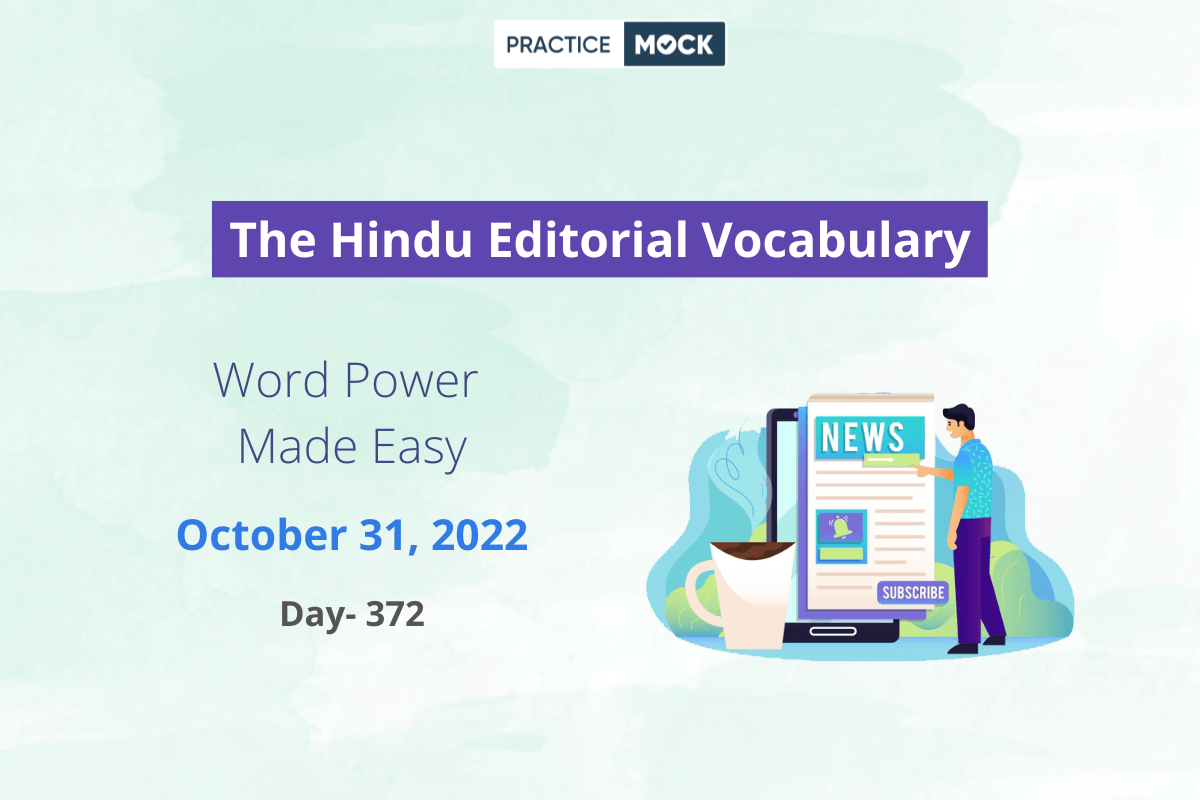| Difficult Word/ Phrase | Contextual Sense |
| Persuade | Win approval or support for |
| Marker | A distinguishing symbol |
| Architecture | the structure or design of anything |
| Spotlight | A focus of public attention |
| Uphill | Against difficulties |
| Lone | Being the only one; single and isolated from others |
| Execution | Putting a condemned person to death |
| Grey-listing | Those countries which are not considered as the safe heaven for supporting terror funding and money laundering |
| Convict | find or declare guilty |
| Extradite | Hand over to the authorities of another country |
| Radicalisation | Make more radical in social or political outlook |
| Deliberation | discussion of all sides of a question |
| Momentum | An impelling force or strength |
| Long on | having or providing a large amount of (something) |
| Short on | to have less of something than you should have |
United against terror: On UNSC Counter-Terrorism Committee meeting in India
India must continue to persuade (Win approval or support for) others that terrorism is a threat to humanity
India’s decision to host the United Nations Security Council’s Counter-Terrorism Committee (CTC) is an important marker (A distinguishing symbol) of the Government’s ongoing effort to highlight terrorism issues at a time the global body has been more focused on the Ukraine war. Held in Mumbai and Delhi, it brought UN officials, and ministers and diplomats from all members of the Security Council (UNSC), to discuss challenges to the global counter-terrorism architecture (the structure or design of anything). In Mumbai, the spotlight (A focus of public attention) was on the 26/11 attacks. Despite the global nature of the terror targets, India has had an uphill (Against difficulties) battle since 2008 in international cooperation to pursue the case, and in bringing the lone (Being the only one; single and isolated from others) surviving attacker, Ajmal Kasab, through a full trial and execution (Putting a condemned person to death). After a brief period of information sharing, Pakistan has dragged its feet on prosecuting even LeT commanders Hafiz Saeed, Zaki-ur-Rahman Lakhvi and others that its Federal Investigative Agency held responsible for the attacks. During the UNSC conference, the attendees heard not only from victims of the attacks but also voice samples of LeT recruiter Sajid Mir directing terrorists during the attacks; even so Mir, now in a Pakistani prison on terror financing charges, after Pakistan’s grey-listing (Those countries which are not considered as the safe heaven for supporting terror funding and money laundering) at the Financial Action Task Force mandated action, has not been tried. The U.S., which has cooperated in many other ways with India on terrorism, convicted (find or declare guilty) conspirators David Headley and Tahawwur Rana for the attacks, but has refused to extradite (Hand over to the authorities of another country) them. Meanwhile, China continues to block designating LeT leaders on the UNSC 1267 terror list, a problem External Affairs Minister S. Jaishankar and U.S. Secretary of State Antony Blinken specifically mentioned at the conference.
In Delhi, the CTC focus was on online radicalisation (Make more radical in social or political outlook) and terror recruitment, terror financing through crypto-currency and virtual assets, and unmanned aerial system use including drones for terror strikes, transporting drugs and arms. The deliberations (discussion of all sides of a question) led to the “Delhi Declaration on countering the use of new and emerging technologies for terrorist purposes”. While India has only two months left in its current elected tenure at the UNSC, the Government appears to be making efforts to keep up the momentum (An impelling force or strength) from the CTC meet; it will host an international “No Money For Terror” conference (November 18-19), and a UNSC special briefing on challenges to global counter-terrorism efforts (December 15-16). As the Indian experience with 26/11 has shown, the global community has often been long on (having or providing a large amount of (something)) statements but short on (to have less of something than you should have) cooperative action, and New Delhi will have to keep pressing the point that terrorism remains, in Mr. Jaishankar’s words, amongst the “gravest threats to humanity”.
Want to improve your vocabulary further? Download the Lists of Word-Meanings of Previous Months here.
- Sign Up on Practicemock for Updated Current Affairs, Free Topic Tests and Free Mini Mocks
- Sign Up Here to Download Free Study Material
Free Mock Tests for the Upcoming Exams
- RRB PO 2024 Free Mock Test
- RRB Clerk 2024 Free Mock Test
- SSC MTS Free Mock Test
- SSC CHSL Free Mock Test
- SSC CGL Free Mock Test
- GATE Mechanical Free Mock Test
- GATE Civil Free Mock Test
- NABARD Gr. A Free Mock Test
- SBI Clerk Mains Free Mock Test
- SSC CPO Free Mock Test
- AFCAT Free Mock Test
- CAT Free Mock Test
- NIACL Assistant Free Mock Test
- UIIC AO Free Mock Test
- UIIC Assistant Free Mock Test
- GIC Assistant Manager Free Mock Test
- NICL AO Free Mock Test
- Free SSC Live Test
- UPSC CSAT Free Mock Test
- CDS-I Free Mock Test
- RRB ALP Free Mock Test


